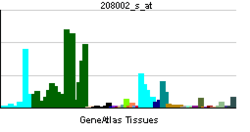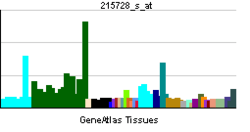ACOT7
| View/Edit Human | View/Edit Mouse |
Cytosolic acyl coenzyme A thioester hydrolase is an enzyme that in humans is encoded by the ACOT7 gene.[3][4][5][6]
This gene encodes a member of the acyl coenzyme family. The encoded protein hydrolyzes the CoA thioester of palmitoyl-CoA and other long-chain fatty acids. Decreased expression of this gene may be associated with mesial temporal lobe epilepsy. Alternatively spliced transcript variants encoding distinct isoforms with different subcellular locations have been characterized.[6]
References
- ↑ "Human PubMed Reference:".
- ↑ "Mouse PubMed Reference:".
- ↑ Yamada J, Kurata A, Hirata M, Taniguchi T, Takama H, Furihata T, Shiratori K, Iida N, Takagi-Sakuma M, Watanabe T, Kurosaki K, Endo T, Suga T (Mar 2000). "Purification, molecular cloning, and genomic organization of human brain long-chain acyl-CoA hydrolase". J Biochem. 126 (6): 1013–9. doi:10.1093/oxfordjournals.jbchem.a022544. PMID 10578051.
- ↑ Hunt MC, Yamada J, Maltais LJ, Wright MW, Podesta EJ, Alexson SE (Aug 2005). "A revised nomenclature for mammalian acyl-CoA thioesterases/hydrolases". J Lipid Res. 46 (9): 2029–32. doi:10.1194/jlr.E500003-JLR200. PMID 16103133.
- ↑ Hunt MC, Rautanen A, Westin MA, Svensson LT, Alexson SE (Aug 2006). "Analysis of the mouse and human acyl-CoA thioesterase (ACOT) gene clusters shows that convergent, functional evolution results in a reduced number of human peroxisomal ACOTs". FASEB J. 20 (11): 1855–64. doi:10.1096/fj.06-6042com. PMID 16940157.
- 1 2 "Entrez Gene: ACOT7 acyl-CoA thioesterase 7".
External links
- Human ACOT7 genome location and ACOT7 gene details page in the UCSC Genome Browser.
Further reading
- Yamada J (2006). "Long-chain acyl-CoA hydrolase in the brain.". Amino Acids. 28 (3): 273–8. doi:10.1007/s00726-005-0181-1. PMID 15731883.
- Yamada J, Kuramochi Y, Takagi M, et al. (2003). "Human brain acyl-CoA hydrolase isoforms encoded by a single gene.". Biochem. Biophys. Res. Commun. 299 (1): 49–56. doi:10.1016/S0006-291X(02)02587-1. PMID 12435388.
- Strausberg RL, Feingold EA, Grouse LH, et al. (2003). "Generation and initial analysis of more than 15,000 full-length human and mouse cDNA sequences". Proc. Natl. Acad. Sci. U.S.A. 99 (26): 16899–903. doi:10.1073/pnas.242603899. PMC 139241
 . PMID 12477932.
. PMID 12477932. - Ota T, Suzuki Y, Nishikawa T, et al. (2004). "Complete sequencing and characterization of 21,243 full-length human cDNAs". Nat. Genet. 36 (1): 40–5. doi:10.1038/ng1285. PMID 14702039.
- Gerhard DS, Wagner L, Feingold EA, et al. (2004). "The Status, Quality, and Expansion of the NIH Full-Length cDNA Project: The Mammalian Gene Collection (MGC)". Genome Res. 14 (10B): 2121–7. doi:10.1101/gr.2596504. PMC 528928
 . PMID 15489334.
. PMID 15489334. - Yang JW, Czech T, Yamada J, et al. (2005). "Aberrant cytosolic acyl-CoA thioester hydrolase in hippocampus of patients with mesial temporal lobe epilepsy". Amino Acids. 27 (3–4): 269–75. doi:10.1007/s00726-004-0138-9. PMID 15592755.
- Gregory SG, Barlow KF, McLay KE, et al. (2006). "The DNA sequence and biological annotation of human chromosome 1". Nature. 441 (7091): 315–21. doi:10.1038/nature04727. PMID 16710414.
- Lim J, Hao T, Shaw C, et al. (2006). "A protein-protein interaction network for human inherited ataxias and disorders of Purkinje cell degeneration". Cell. 125 (4): 801–14. doi:10.1016/j.cell.2006.03.032. PMID 16713569.
This article is issued from Wikipedia - version of the 11/30/2016. The text is available under the Creative Commons Attribution/Share Alike but additional terms may apply for the media files.

